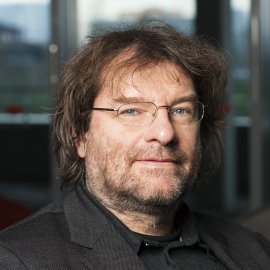History, Director of Re-Work, Humbolt University of Berlin, Germany

Janvier à Mars 2016
Andreas ECKERT, born in 1964, studied between 1985 and 1990 history, French and journalism in Hamburg, Yaoundé and Aix-en-Provence. He did his Master in history in 1990 at the University of Hamburg, followed by a Ph.D in history in 1995, also in Hamburg. Between 1995 and 2002, Eckert worked as assistant professor at the Department of Asian and African Studies at Humboldt University Berlin. During this period, he took fellowships at the Center for Modern Oriental Studies (1998-2000), and German Historical Institute London (2000) and the Fritz-Thyssen-Foundation (2000). After his habilitation in 2002 at Humboldt University, Eckert was Professor of Modern History at the University of Hamburg (2002-2007).
Since 2007 he has been chair of African History at Humboldt University Berlin, since 2009 also Director of the International Research Center, Work and Human Life Course in Global History“, funded by the German Federal Ministry of Research and Education.
ECKERT was visiting professor and fellow at numerous institutions, e.g. Harvard University, University of Michigan at Ann Arbor, the Maison des Sciences de l’homme, the EHESS and the Stellenbosch Institute for Advanced Study. He published widely on numerous aspects of Modern African History, the history of colonialism and global labour history. He is currently finishing a general history of Africa and working on a larger study on the history of work in a global perspective.
"Connecting Histories of Work and Non-Work. African Labour History in a Global Perspective"
A global perspective on the history of work and labor does neither consist in simply expanding or complicating Western labor history, nor directing the focus exclusively to the non-European world. Work and labor could provide tools to explain in a more concrete manner the ways in which “the West and the rest" have influenced each other. One of the central merits of global labor history is to stress that free and unfree, paid and unpaid labour should be dealt with equally and that there is no unilinear path from unfree to free labour. My research project I will work on at the IEA in Nantes is actually part of a larger and rather ambitious attempt to write a global labor history of the 20th century. During my stay in Nantes, I plan to particularly analyze to what extent a global perspective might offer fresh insights into the history of work in Africa, especially since contemporary labor history in Africa and elsewhere has had a microhistorical focus on workers and work in relation to the range of social processes in a particular milieu – for instance gender and ethnicity.
- So, what is the advantage of looking beyond both a specific African locality and region toward wider spatial relationships, in addition to the insight that we are confronted with fuzzy categories and constellations?
More specifically I want to explore the problem of setting boundaries between work and non-work:
- What constitutes work and what is excluded from it?
- What is legitimate and what is illegal work?
- Who is inventing, abolishing and resurrecting these divisions?
- And what are the practices and policies surrounding these questions?
He will analyze the transformations the division between work and non-work underwent in 20th century Africa, by looking especially at labor and social regulations as well as at the role the state and international organizations such as the ILO played in these processes.